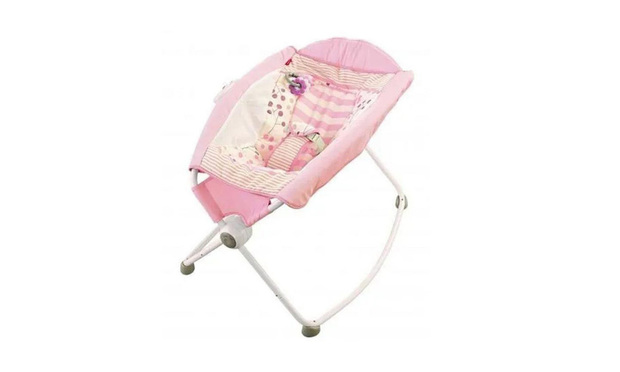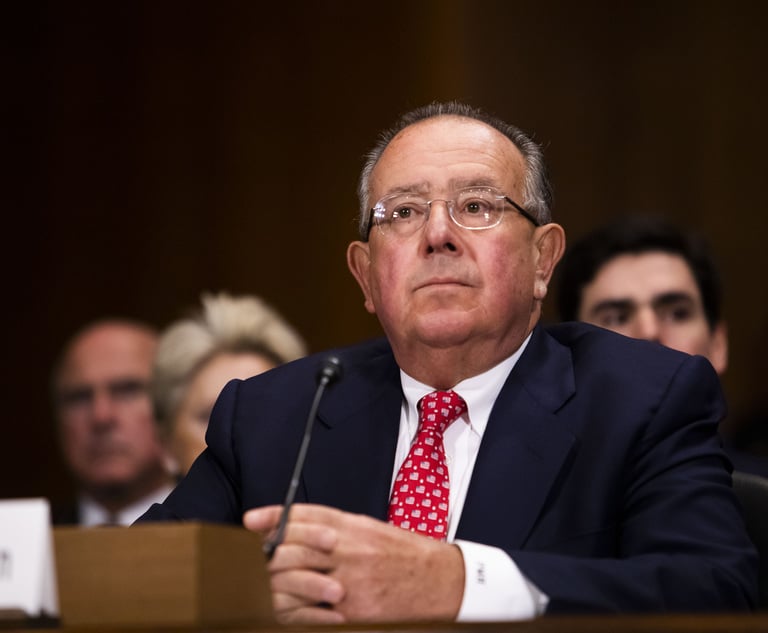Lawsuits Over Recalled Rock 'n Play Sleepers Coordinated in New York
The U.S. Judicial Panel on Multidistrict Litigation, in its Thursday order, rejected a request from Mattel Inc., parent company of Fisher-Price, to transfer the cases to the Central District of California. Most plaintiffs' attorneys had opposed an MDL.
August 02, 2019 at 12:30 PM
4 minute read
 Fisher-Price Rock ‘n Play Sleeper.
Fisher-Price Rock ‘n Play Sleeper.
A federal judicial panel has bounced 15 lawsuits to New York over this year’s recall of 4.7 million Rock ‘n Play infant sleepers sold by Fisher-Price Inc.
Thursday’s order, by the U.S. Judicial Panel on Multidistrict Litigation, comes on the same day that the Consumer Product Safety Commission announced that another company, Dorel Juvenile Group, had recalled 24,000 Eddie Bauer and Disney infant sleepers. The Dorel recall referenced infant fatalities with other sleepers; the Rock ‘N Play sleepers were tied to 32 deaths, as well as hundreds of injuries such as flat heads and twisted necks in infants.
The MDL panel sent the Rock ‘N Play cases to the Western District of New York. In the ruling, the panel disagreed with most of the plaintiffs attorneys, who had objected to an MDL. Yet panelists selected a venue that the plaintiffs attorneys suggested would be appropriate in the event of an MDL.
“This district has a strong connection to these cases,” wrote the panel’s chairwoman Sarah Vance, noting that Fisher-Price is based in East Aurora and that “critical events and decisions underlying plaintiffs’ claims” occurred there. She also wrote that 10 of the cases were in the Western District of New York.
The panel disagreed with Mattel Inc., parent company of Fisher-Price, which had moved to create an MDL in the Central District of California near its headquarters in El Segundo, California. Mattel had criticized the “overcrowded dockets of the judges” in the Western District of New York and accused plaintiffs lawyers of “obvious forum shopping” because many had refiled their cases in the Western District of California.
U.S. District Judge Geoffrey Crawford of the District of Vermont will oversee the MDL. He is chief judge of the District of Vermont and an appointee of President Barack Obama but sits as a visiting judge at the Western District of New York. He has not yet overseen an MDL.
Mattel’s voluntary recall April 12 cited risks that infants could suffocate if they rolled from their backs to their stomachs or sides. The recall provides full refunds to consumers who purchased the products as of Oct. 12, at prices that range from $40 to $149, while others would receive vouchers.
The lawsuits, most of which allege no injuries, said the recall is inadequate, in part because it limited refunds to consumers who owned the sleepers for six months or less. The suits also target what they called Fisher-Price’s deceptive and misleading marketing of the product for overnight sleep, despite recommendations from pediatricians that babies should sleep flat on their backs.
In a statement released on the day of the recall, Mattel urged parents to stop using the product. It also suggested that some parents had not followed warnings on the box.
Plaintiffs attorneys, in opposing an MDL, had suggested that the lawsuits, most of which are class actions alleging consumer fraud, were not that complex. But the panel, agreeing with Mattel, predicted that the litigation would involve expert discovery on several topics.
“The plaintiffs opposing centralization do not dispute the existence of common factual issues, but they argue that these factual issues are not sufficiently complex to warrant centralization,” Vance wrote. “We reject this argument. Discovery regarding the design of the RNPS (Rock ‘n Play sleeper) and whether it unreasonably increases the risk of positional asphyxiation in infants likely will be more akin to the discovery required in products liability litigations than run-of-the-mill false advertising lawsuits, with expert testimony required on a number of complicated topics, such as the suitability of the RNPS for prolonged sleeping by infants.”
This content has been archived. It is available through our partners, LexisNexis® and Bloomberg Law.
To view this content, please continue to their sites.
Not a Lexis Subscriber?
Subscribe Now
Not a Bloomberg Law Subscriber?
Subscribe Now
NOT FOR REPRINT
© 2025 ALM Global, LLC, All Rights Reserved. Request academic re-use from www.copyright.com. All other uses, submit a request to [email protected]. For more information visit Asset & Logo Licensing.
You Might Like
View All
Decision of the Day: Judge Dismisses Defamation Suit by New York Philharmonic Oboist Accused of Sexual Misconduct

Private Equity Giant KKR Refiles SDNY Countersuit in DOJ Premerger Filing Row
3 minute read
Decision of the Day: Judge Rules Brutality Claims Against Hudson Valley Police Officer to Proceed to Trial

Skadden and Steptoe, Defending Amex GBT, Blasts Biden DOJ's Antitrust Lawsuit Over Merger Proposal
4 minute readTrending Stories
Who Got The Work
J. Brugh Lower of Gibbons has entered an appearance for industrial equipment supplier Devco Corporation in a pending trademark infringement lawsuit. The suit, accusing the defendant of selling knock-off Graco products, was filed Dec. 18 in New Jersey District Court by Rivkin Radler on behalf of Graco Inc. and Graco Minnesota. The case, assigned to U.S. District Judge Zahid N. Quraishi, is 3:24-cv-11294, Graco Inc. et al v. Devco Corporation.
Who Got The Work
Rebecca Maller-Stein and Kent A. Yalowitz of Arnold & Porter Kaye Scholer have entered their appearances for Hanaco Venture Capital and its executives, Lior Prosor and David Frankel, in a pending securities lawsuit. The action, filed on Dec. 24 in New York Southern District Court by Zell, Aron & Co. on behalf of Goldeneye Advisors, accuses the defendants of negligently and fraudulently managing the plaintiff's $1 million investment. The case, assigned to U.S. District Judge Vernon S. Broderick, is 1:24-cv-09918, Goldeneye Advisors, LLC v. Hanaco Venture Capital, Ltd. et al.
Who Got The Work
Attorneys from A&O Shearman has stepped in as defense counsel for Toronto-Dominion Bank and other defendants in a pending securities class action. The suit, filed Dec. 11 in New York Southern District Court by Bleichmar Fonti & Auld, accuses the defendants of concealing the bank's 'pervasive' deficiencies in regards to its compliance with the Bank Secrecy Act and the quality of its anti-money laundering controls. The case, assigned to U.S. District Judge Arun Subramanian, is 1:24-cv-09445, Gonzalez v. The Toronto-Dominion Bank et al.
Who Got The Work
Crown Castle International, a Pennsylvania company providing shared communications infrastructure, has turned to Luke D. Wolf of Gordon Rees Scully Mansukhani to fend off a pending breach-of-contract lawsuit. The court action, filed Nov. 25 in Michigan Eastern District Court by Hooper Hathaway PC on behalf of The Town Residences LLC, accuses Crown Castle of failing to transfer approximately $30,000 in utility payments from T-Mobile in breach of a roof-top lease and assignment agreement. The case, assigned to U.S. District Judge Susan K. Declercq, is 2:24-cv-13131, The Town Residences LLC v. T-Mobile US, Inc. et al.
Who Got The Work
Wilfred P. Coronato and Daniel M. Schwartz of McCarter & English have stepped in as defense counsel to Electrolux Home Products Inc. in a pending product liability lawsuit. The court action, filed Nov. 26 in New York Eastern District Court by Poulos Lopiccolo PC and Nagel Rice LLP on behalf of David Stern, alleges that the defendant's refrigerators’ drawers and shelving repeatedly break and fall apart within months after purchase. The case, assigned to U.S. District Judge Joan M. Azrack, is 2:24-cv-08204, Stern v. Electrolux Home Products, Inc.
Featured Firms
Law Offices of Gary Martin Hays & Associates, P.C.
(470) 294-1674
Law Offices of Mark E. Salomone
(857) 444-6468
Smith & Hassler
(713) 739-1250






